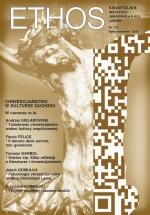 zobacz powiększenie | DOI 10.12887/29-2016-3-115-15 Agnieszka LEKKA-KOWALIK – Towards the Autonomy of Ethics: Methodological Remarks Cena brutto: 7,00 PLN za szt. |
|
Against the background of some methodological distinctions introduced by Stanisław Kamiński the paper advances the claim that the issue of the autonomy of a scientific discipline concerns cognitive rather than institutional autonomy. The former requires that a discipline have a subjectual rather than meta-subjectual character. Ethics, as conceived of by Tadeusz Styczeń, fulfils this requirement: it has its own empirical data in the form of individual ethical judgments concerning moral oughtness; those judgments grasp normative facts, i.e., real and objective relationships between persons. The operation of ‘exchanging’ persons in a judgment: “I ought to do X to C,” allows us to generalize judgments and thereby to form a general ethical judgement taken to be true: Any person as person deserves affirmation from any person as person. Styczeń distinguishes three dimensions in this judgement, concerning, respectively: existence (the oughtness captured in the judgement is a real relationship), oughtness (the ‘content’ of the oughtness is affirmation, i.e., love), and rightness (what should be done as an ‘expression’ of affirmation). Explaining the existential dimension belongs to metaphysics. Ethics is cognitively autonomous in its oughtness dimension, for it has its own empirical data, although the ultimate explanation of those data belongs to the anthropology of the personal ‘I.’ In the dimension of rightness ethics is not autonomous, for determining what is a right realization of affirmation depends on a ‘total’ anthropology. Distinguishing oughtness and rightness of the ethical judgement, or—as I suggest in the paper—decomposing that judgement into two: “I ought to affirm the person,” and “I ought to do X as a way of affirming,” does not solve the cognitive autonomy of ethics, as a few problems appear. First, according to Styczeń, ethics must have a proprium in order to capture the fact of inconsistent judgments about what is the right way of affirming the person. This means that the anthropology of the personal ‘I”’ must be complemented by some anthropological theses. Two questions arise then: What sources do those additional theses have? Does this mean that ethical judgments are true only within a system of ‘total anthropology’? Secondly, it needs to be determined what kinds of beings can be put as terms of the oughtness relationship. Styczeń concentrates on persons but there are good reasons to claim that other beings, such as the family, the state or institutions, can be oughtness-creating. What status does the judgement “I am morally obliged to do X to my university” have? Is this judgement empirical or deduced from other theses? Thirdly, the contemporary philosophy of science claims—with good reasons—that observation is theory-laden or that observation depends on background beliefs. An ethicist faces then an alternative: he needs either to show that ‘ethical observation’ is not theory-laden or to recognize its theory-ladenness and indicate the sources of the background beliefs. Solutions to these problems will influence the understanding of the cognitive autonomy of ethics. The paper ends with the issue of cognitive autonomy as an epistemic value when seen against the background of the idea that research should have an inter- and transdisciplinary character. Keywords: Tadeusz Styczeń, autonomy of ethics, cognitive autonomy, institutional autonomy, ethical judgment, judgment about the right means, moral oughtness, background beliefs, autonomy of science versus interdisciplinary (transdisciplinary) research The article is a changed version of the presentation delivered during the seminar “The Autonomy of Ethics Today,” held by the John Paul II Institute at the Catholic University of Lublin on December 11, 2015. Contact: Department of the Methodology of Sciences, Institute of Philosophy, Faculty of Philosophy, E-mail: alekka@kul.lublin.pl Pliki do pobrania: » 115Lekka.pdf | |
